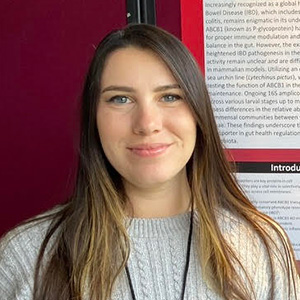
Lauren Stoeltje
Program: Master’s Program in Cell and Molecular Biology
Date: Wednesday, October 23, 2024
Time: 04:30 PM
Location: North Life Sciences 101 Conference Room
Zoom: https://SDSU.zoom.us/j/86766281139
Committee Members
- Dr. Catherine Schrankel, Chair (Biology)
- Dr. Scott Kelley (Biology)
- Dr. Eunha Hoh (School of Public Health)
Abstract
Increasingly recognized as a global health challenge, Inflammatory Bowel Disease (IBD), which includes Crohn’s disease and ulcerative colitis, remains enigmatic in its underlying causes. Recent insights point to dysregulated immune responses against the intestinal microbiota in genetically susceptible individuals. The transporter ABCB1 (known as P-glycoprotein) has emerged as a pivotal player for proper immune modulation and maintenance of microbial balance in the gut. However, the exact mechanisms leading to heightened IBD pathogenesis in the absence of strong ABCB1 activity remain unclear, and are difficult to quickly test and validate in mammalian models.
Using an ABCB1 knockout (KO) sea urchin model (Lytechinus pictus), we investigated the transporter’s role in gut homeostasis. Imaging revealed significant inflammation and altered gut morphology in ABCB1-KO larvae at early developmental stages. 16S amplicon sequencing of the larval gut microbiota showed distinct microbial communities between ABCB1-KO and wild-type (WT) larvae, with beta diversity analyses confirming clear compositional differences. Taxonomic analyses was conducted to identify specific microbial shifts across different larval stages, providing further insight into how ABCB1 influences gut microbiota structure.
This study underscores the importance of ABCB1 in gut function, highlighting its potential role in regulating microbial-epithelial interactions. These findings provide a foundation for understanding ABCB1’s involvement in gut health, with broader implications for IBD research and treatment strategies.

